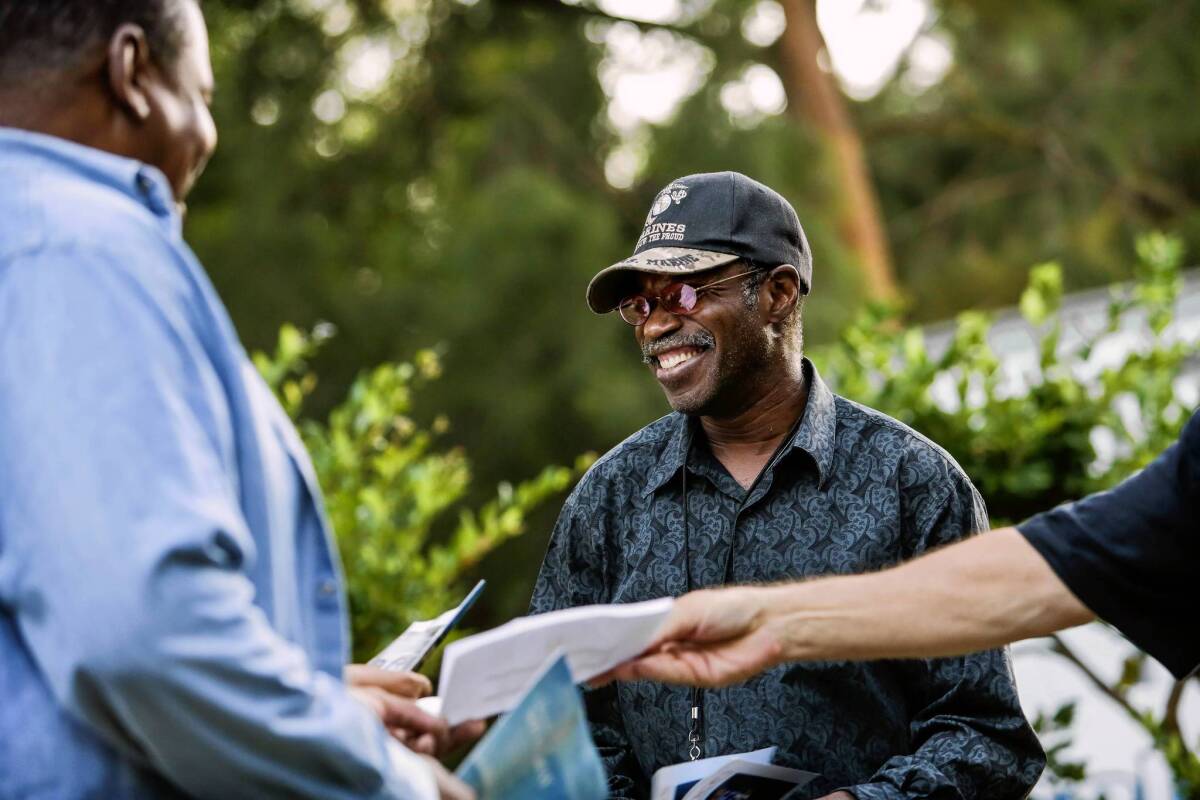L.A.’s Shakespeare Center sets stage for military veterans’ success

- Share via
Fifteen years ago former Pfc. and military police officer Jerry Whiteside had two masks tattooed on his left bicep, one smiling, one frowning.
Inspired by the woman he was dating, an interest in theater and an assortment of substances in his system, Whiteside felt the tattoo was the logical step.
“I read from Shakespeare, and I always had the dream of being in theater,” Whiteside said. “I wear a comedy and tragedy tattoo on my arm, and most people will call it ‘Smile now, cry later,’ and I tell them, ‘No, that’s not what it stands for.’”
Little did he know that more than a decade later, he would be symbolically reunited with the images imprinted on his skin.
PHOTOS: Arts and culture in pictures by The Times
His journey began at the end of a 30-year struggle with drugs and alcohol, he said. Whiteside, a Chicago native turned Angeleno who had served in the Marine Corps from 1972 to ‘76, sought help from the Veterans Administration in Los Angeles. He completed a detoxification program in 2011 and for this summer was referred to the Shakespeare Center of Los Angeles to do various jobs on the set of “A Midsummer Night’s Dream.”
Whiteside, 61, and some 30 other veterans of the Afghanistan, Iraq, Vietnam and the Gulf wars assisted in building the set and working odd jobs with the production, which continues through July 28.
Shakespeare Center artistic director Ben Donenberg said employing veterans stemmed from another of the company’s outreach programs, Will Power to Youth, which hires young Angelenos to study and perform Shakespeare plays. After seeing alumni of the program serving in the armed services and later seeking jobs at home, Donenberg said, the company decided to extend its employment program opportunity to veterans, starting last year.
By coincidence, Shakespeare Center’s summer productions have been presented at the Japanese Garden of the VA campus in West Los Angeles since last summer.
CHEAT SHEET: Spring Arts Preview
Donenberg shared his motto, “Art can be great, and art can do great things.”
Veterans earn $10 an hour and are hired for a two-month period, which includes the show’s two-week run along with set-up and tear-down. In addition, the center hires vets throughout the year for other projects.
For many of the employed veterans, the prescription to work comes from therapists at the VA. Chris Anthony, associate artistic director at the Shakespeare Center, said the opportunity to work helps veterans adjust from life in a combat setting.
“One of the things we want to do as a company is to ease the transition to civilian life, and part of that is on the civilians; there’s only so much the veterans can do,” Anthony said. “The rest of us have to see them in a different light. It’s something we need to work on as civilians.”
Ricky Walker, 54, of Brawley, a former cannoneer who served for three years in the Army, assists playgoers at each of the productions.
Since returning from combat in 1981, Walker said he has struggled financially, was incarcerated and had a failed marriage. Working with the VA has allowed him to start putting his life back together and enabled people outside the military sphere to understand the struggles that veterans face, he said.
“It’s a nice experience because people get to ask us personal questions that they’re not going to get in the brochure,” Walker said. “Having people be more aware of the vets is important because most people think war vets, just because they see them on the road, are all like that. They don’t want to see them, and they don’t see that each situation is different.”
Whiteside, who cheerfully passes out programs before each show, says the experience has helped him readjust; he said he left the service “a little off center.” The opportunity to work and continued support from the VA have helped the former addict stay clean.
“I look back and say, ‘Yeah, I made those mistakes and I learned from them,’” Whiteside said. “I’m two years clean now. After 25, 30 years of drug and alcohol, two years is a long time.”
Whiteside has had the opportunity to watch “A Midsummer Night’s Dream” on evenings when he was working and said he is re-inspired to pursue a career in theater. He hopes to continue working behind the scenes in other productions and keep building sets as he did this summer.
In the parking lot of the Japanese Garden, James Simpson, 51, ushers guests to their parking spots.
The former Air Force sergeant has worked various odd jobs since returning from service but said he hasn’t been able to find anything steady. His employment with the Shakespeare Center will end shortly after the play’s final performance, but the relationship might not end then. The center works to help the veterans find other employment after the curtains close.
Tommy Sowers, assistant secretary of the Department of Veterans Affairs, said Donenberg’s own outreach efforts and the center’s follow-through set the program apart.
“He and the folks that sponsor the Shakespeare Center have a commitment to veterans,” Sowers said. “Many employers say they do, but they actually show it.”
“A Midsummer Night’s Dream”
Where: Shakespeare Center of Los Angeles, Japanese Garden, West Los Angeles VA, 11301 Wilshire Blvd.
When: 8 p.m. Tuesdays through Sundays. Ends July 28.
Cost: $25
Info: https://www.shakespearecenter.org
Running time: 2 hours, 20 minutes
More to Read
The biggest entertainment stories
Get our big stories about Hollywood, film, television, music, arts, culture and more right in your inbox as soon as they publish.
You may occasionally receive promotional content from the Los Angeles Times.










